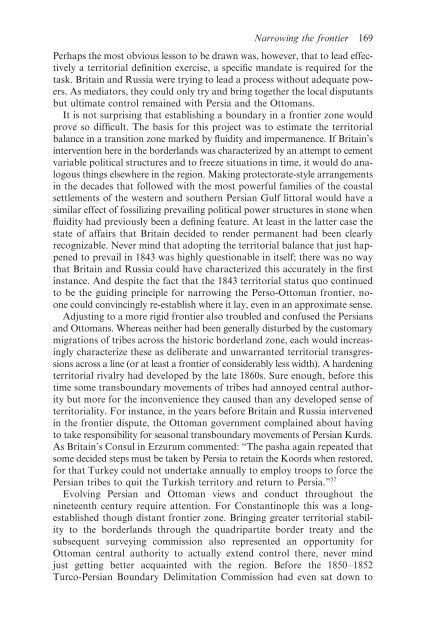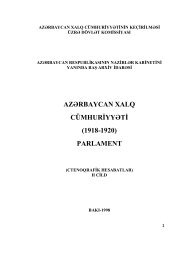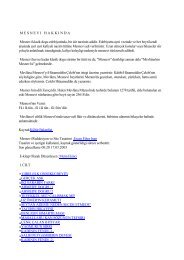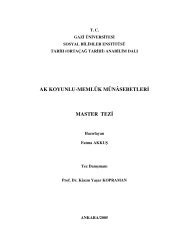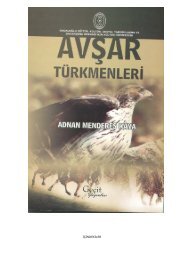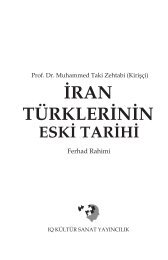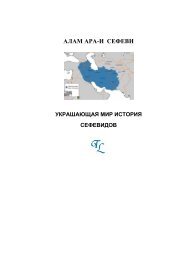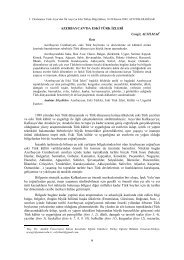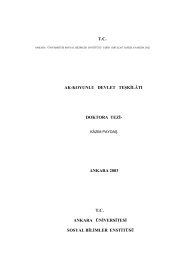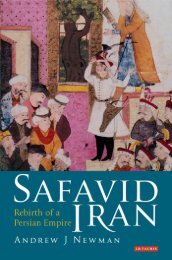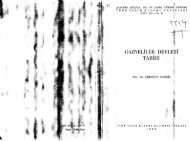War and Peace in Qajar Persia: Implications Past and ... - Oguzlar.az
War and Peace in Qajar Persia: Implications Past and ... - Oguzlar.az
War and Peace in Qajar Persia: Implications Past and ... - Oguzlar.az
- No tags were found...
You also want an ePaper? Increase the reach of your titles
YUMPU automatically turns print PDFs into web optimized ePapers that Google loves.
Narrow<strong>in</strong>g the frontier 169Perhaps the most obvious lesson to be drawn was, however, that to lead effectivelya territorial def<strong>in</strong>ition exercise, a specific m<strong>and</strong>ate is required for thetask. Brita<strong>in</strong> <strong>and</strong> Russia were try<strong>in</strong>g to lead a process without adequate powers.As mediators, they could only try <strong>and</strong> br<strong>in</strong>g together the local disputantsbut ultimate control rema<strong>in</strong>ed with <strong>Persia</strong> <strong>and</strong> the Ottomans.It is not surpris<strong>in</strong>g that establish<strong>in</strong>g a boundary <strong>in</strong> a frontier zone wouldprove so difficult. The basis for this project was to estimate the territorialbalance <strong>in</strong> a transition zone marked by fluidity <strong>and</strong> impermanence. If Brita<strong>in</strong>’s<strong>in</strong>tervention here <strong>in</strong> the borderl<strong>and</strong>s was characterized by an attempt to cementvariable political structures <strong>and</strong> to freeze situations <strong>in</strong> time, it would do analogousth<strong>in</strong>gs elsewhere <strong>in</strong> the region. Mak<strong>in</strong>g protectorate-style arrangements<strong>in</strong> the decades that followed with the most powerful families of the coastalsettlements of the western <strong>and</strong> southern <strong>Persia</strong>n Gulf littoral would have asimilar effect of fossiliz<strong>in</strong>g prevail<strong>in</strong>g political power structures <strong>in</strong> stone whenfluidity had previously been a def<strong>in</strong><strong>in</strong>g feature. At least <strong>in</strong> the latter case thestate of affairs that Brita<strong>in</strong> decided to render permanent had been clearlyrecognizable. Never m<strong>in</strong>d that adopt<strong>in</strong>g the territorial balance that just happenedto prevail <strong>in</strong> 1843 was highly questionable <strong>in</strong> itself; there was no waythat Brita<strong>in</strong> <strong>and</strong> Russia could have characterized this accurately <strong>in</strong> the first<strong>in</strong>stance. And despite the fact that the 1843 territorial status quo cont<strong>in</strong>uedto be the guid<strong>in</strong>g pr<strong>in</strong>ciple for narrow<strong>in</strong>g the Perso-Ottoman frontier, noonecould conv<strong>in</strong>c<strong>in</strong>gly re-establish where it lay, even <strong>in</strong> an approximate sense.Adjust<strong>in</strong>g to a more rigid frontier also troubled <strong>and</strong> confused the <strong>Persia</strong>ns<strong>and</strong> Ottomans. Whereas neither had been generally disturbed by the customarymigrations of tribes across the historic borderl<strong>and</strong> zone, each would <strong>in</strong>creas<strong>in</strong>glycharacterize these as deliberate <strong>and</strong> unwarranted territorial transgressionsacross a l<strong>in</strong>e (or at least a frontier of considerably less width). A harden<strong>in</strong>gterritorial rivalry had developed by the late 1860s. Sure enough, before thistime some transboundary movements of tribes had annoyed central authoritybut more for the <strong>in</strong>convenience they caused than any developed sense ofterritoriality. For <strong>in</strong>stance, <strong>in</strong> the years before Brita<strong>in</strong> <strong>and</strong> Russia <strong>in</strong>tervened<strong>in</strong> the frontier dispute, the Ottoman government compla<strong>in</strong>ed about hav<strong>in</strong>gto take responsibility for seasonal transboundary movements of <strong>Persia</strong>n Kurds.As Brita<strong>in</strong>’s Consul <strong>in</strong> Erzurum commented: “The pasha aga<strong>in</strong> repeated thatsome decided steps must be taken by <strong>Persia</strong> to reta<strong>in</strong> the Koords when restored,for that Turkey could not undertake annually to employ troops to force the<strong>Persia</strong>n tribes to quit the Turkish territory <strong>and</strong> return to <strong>Persia</strong>.” 57Evolv<strong>in</strong>g <strong>Persia</strong>n <strong>and</strong> Ottoman views <strong>and</strong> conduct throughout then<strong>in</strong>eteenth century require attention. For Constant<strong>in</strong>ople this was a longestablishedthough distant frontier zone. Br<strong>in</strong>g<strong>in</strong>g greater territorial stabilityto the borderl<strong>and</strong>s through the quadripartite border treaty <strong>and</strong> thesubsequent survey<strong>in</strong>g commission also represented an opportunity forOttoman central authority to actually extend control there, never m<strong>in</strong>djust gett<strong>in</strong>g better acqua<strong>in</strong>ted with the region. Before the 1850–1852Turco-<strong>Persia</strong>n Boundary Delimitation Commission had even sat down to


